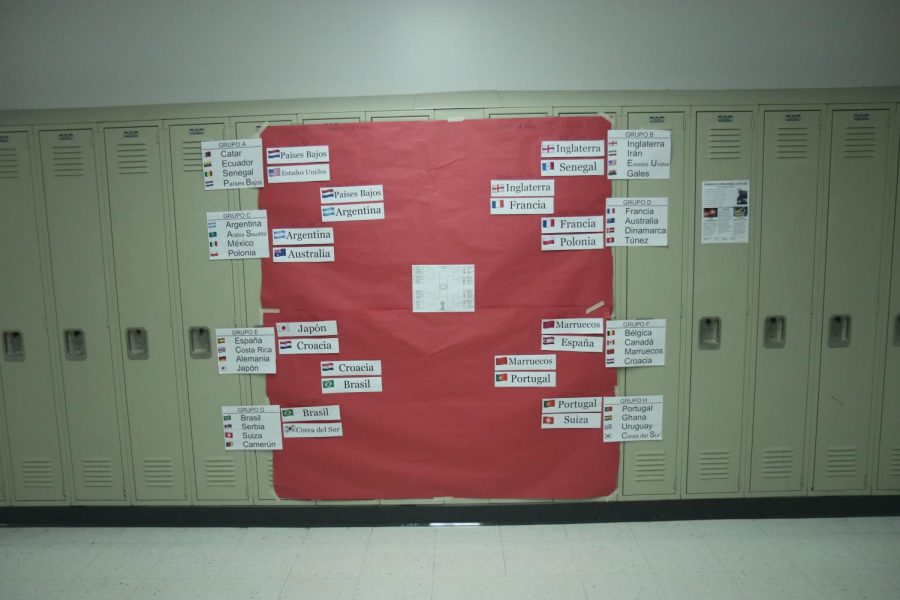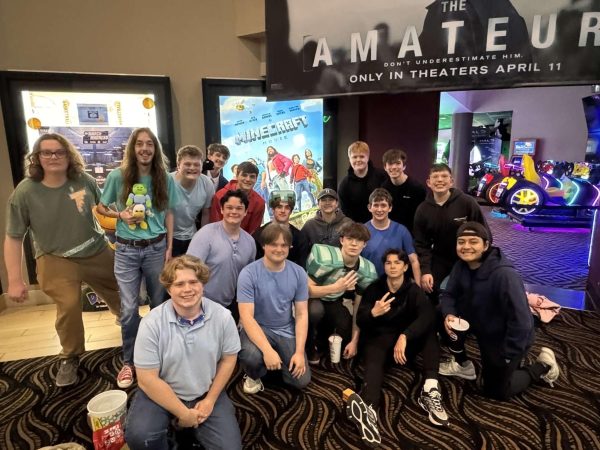Language classes study World Cup
In the world language hallway, a bracket hangs on the lockers, depicting the 2022 World Cup up to the Quarterfinals in Spanish. French and Spanish teachers are learning about the World Cup during their classes.
French and Spanish teachers are incorporating the World Cup games into their curriculums this winter.
Since 1930, the World Cup (which takes place every four years) has been held during the summer. However, it is being held from November 20 to December 18 because the games are in Qatar, which would be too hot for the summer. Spanish teacher Kimberly Lackey said that she uses the tournament in her Spanish class by bringing real-world topics and issues into the curriculum.
“My Spanish 3 students learned some of the history of the World Cup (La Copa Mundial) like where it is being played this year when it usually takes place vs when it is taking place this year, where Qatar is located, who has won the most World Cups, and some of the political and human rights controversies surrounding the World Cup,” Lackey said. “They also learned the Spanish words for the positions, games, verbs, and expressions related to soccer. We are keeping a bracket in the World Language hallway with the winning teams in Spanish and the dates and times of the games.”
Lackey said these lessons about the world cup are helping her students engage in their Spanish classes. Senior Charlotte Hurt said that it’s helping her learn about the differences between Spanish culture versus our typical American culture.
“I think [learning about the World Cup in class is] helping me learn about the culture,” Hurt said. “Learning about [the games has] helped put the culture in perspective.”
Although she doesn’t watch soccer regualarly, Spanish III student Taylor Springett said she has developed a deeper understanding for it.
“I think that [learning about the World Cup] is engaging because I didn’t know what was going on. Now, I have somewhat of an idea of what’s going on in it,” Springett said. “We’re doing brackets with our predictions [on who will win] and watching clips on it, which [makes learning about the tournament in Spanish] pretty interesting.”
Spanish students aren’t the only ones being positively affected by the lessons about the World Cup, many French students also said they benefited from the tournament. One of the students is senior Elaine Duan, who is an AP French five student, said that she’s learning more about many French-speaking countries and their traditions surrounding the World Cup.
“I think learning about the world cup is helping my French because it’s an interesting way to learn about French culture and see how both the fans and the players act in comparison to the U.S. team and other countries,” Duan said. “I think it is a very engaging way to learn since it’s about something that is relevant and interesting to a lot of students. Plus it’s fun to watch and discuss soccer in class.”
French teacher Kacey Schlotz said that many students are becoming actively engaged in both learning about the World Cup and about soccer itself.
“We are doing a complete unit in all of our [French] levels this year. We started by explaining how the World Cup started, how the World Cup is, and who plays in the World Cup, and then we’re learning all of the different countries and the country names, [in French],” Schlotz said. “We usually have a sports unit anyway, but we kind of changed our curriculum to incorporate the World Cup in our lessons. We have lots of soccer players and lots of kids interested [in learning about the World Cup].”
Schlotz also said that comparing the World Cup to a major sporting event here in St. Louis also helps the students understand the cultural differences in soccer between the United States and Europe.
“We compared the World Cup in France [like] when the Blues were playing for the Stanley Cup here. Where even if you didn’t like hockey, you knew when the game was, you knew how the Blues were doing, and you saw Blues stuff everywhere because it was such a big deal. That’s what’s going on everywhere in France right now. It’s harder for Americans to understand because soccer is upcoming for St. Louis, with the new stadium, but it’s not a household sport, so we’re trying to teach that it is a big deal there,” Schlotz said.
Your donation will support the student journalists of Rockwood Summit High School. Your contribution will allow us to purchase equipment and cover our annual website hosting costs.




